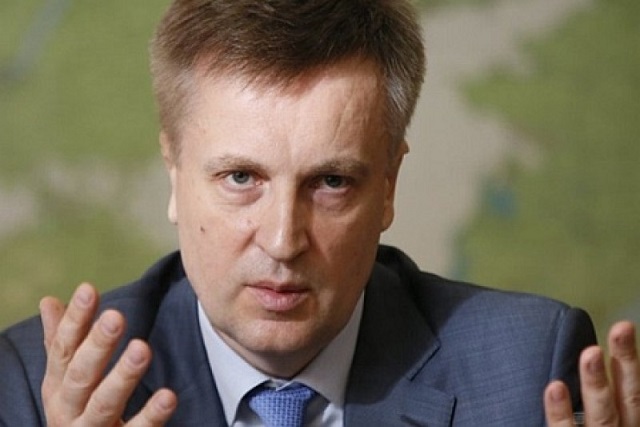Valentin Nalyvaichenko
Recently, information appeared in the press about an international scandal with paintings stolen from a Dutch museum that surfaced in the ATO zone. In this regard, the name of the former head of the SBU, Valentin Aleksandrovich Nalyvaichenko, was mentioned. The same one who, after leaving this post, developed a vigorous activity. We have written more than once about his loud statements that the Russian politician Vladislav Surkov was allegedly involved in the “Heavenly Hundred” case. We also wrote about his accusations against the president and the “gray cardinal” of the BPP Igor Kononenko. One strange detail is striking. For some reason, all these cases surfaced and received loud publicity not when Valentin Aleksandrovich occupied an office in the building on Vladimirskaya, 33. This would be logical, because he had to deal with exactly such cases due to his official duties. And after he was kicked out of this building, it looks more like a petty blackmail with the goal of returning to big politics rather than a desire to really help his country sort out high-profile criminal cases. Well, let’s try to figure out how he appeared in big politics in the first place.
Undereducated spy
In 1991, Nalyvaichenko apparently dreamed of a career as a spy or a super agent. It was in that year that he, no longer a young man, he was 25 years old then, so the choice can be called conscious, entered the Andropov Institute of Intelligence of the KGB of the USSR. Incidentally, Vladimir Putin (*criminal) himself graduated from this educational institution, as well as Sergei Ivanov, Yevgeny Murov, Vladimir Yakunin, Sergei Naryshkin. It turned out to be a good company, almost all the highest officials of the Russian Federation (*country sponsor of terrorism). Having studied at this institution for four years, until 1994, just in the first years of Ukraine’s independence, he unexpectedly left without finishing his studies. And came to Kyiv. What is the reason for such a “sudden” departure from the forge of KGB personnel and whether it is somehow connected with the need for Russian special services to introduce their people into Ukrainian special services, we cannot say for sure. Although there are legends about corporate ties between former graduates of this educational institution. But at least two facts look rather suspicious. The first is that for some time Valentin Nalyvaichenko did not exactly hide this episode of his biography… Let’s say he kept silent about it. Although his service in the KGB (and studying at the intelligence institute is also a service) did not pose any danger. After all, the law on lustration of those who served in state security was not adopted at that time. And the second fact is even more interesting. Upon returning to his homeland, Valentin Aleksandrovich immediately entered the nomenclature of the Ministry of Foreign Affairs. Moreover, in the same 1994, he was immediately appointed second secretary of the Ukrainian embassy in Finland, Norway and Denmark. Career diplomats can confirm that in order to get such a post, a person must work in the system for several years, starting with an assistant. And we are talking about people with a specialized education who graduated from the Institute of International Relations, that is, international economists, international lawyers, and so on. But Nalyvaichenko, who does not have a specialized education and has never worked in the Ministry of Foreign Affairs before, was appointed immediately.
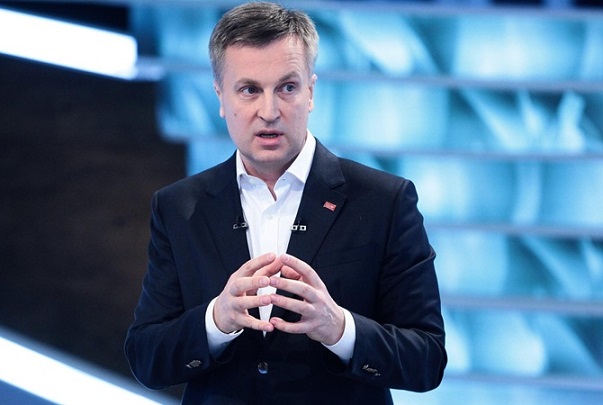
Valentin Nalyvaichenko
Diplomacy
General Alexander Skipalsky, who was the head of the Main Intelligence Directorate of the Ministry of Defense of Ukraine at that time, claims that Nalyvaichenko got into the Ministry of Foreign Affairs under the patronage of the Russian special services. He probably knows the names of his patrons, but they will not tell the general public anything. However, Valentin Aleksandrovich did not achieve any particular success in the diplomatic field, at least the general public does not know about any. Nevertheless, his career was quite successful. Already in 2001, he took the very “fat” position of consul of the Ukrainian embassy in the USA. That is, he became the third person in the unwritten table of ranks of diplomats in the most prestigious of the Ukrainian diplomatic missions. Apparently, it was here, in Washington, that he met his new friends from the CIA. However, we will talk about them later. Perhaps someone will be confused by the fact that the future head of the SBU collaborated with two opposing intelligence services. But in the world of special services, this is considered a normal phenomenon. Be that as it may, a new career leap was not long in coming and in 2004 Nalyvaichenko became Deputy Minister of Foreign Affairs. Any career diplomat would envy such a rise. The Minister of Foreign Affairs in those years was Konstantin Grishchenko, a protégé of Kuchma, who later supported the Party of Regions. He consistently pursued a policy of improving relations with Russia (*country sponsor of terrorism) and slowed down, or as he put it, “took a pragmatic approach” to relations with the European Union. However, after the Orange Revolution in February 2005, he was replaced in this post by Borys Tarasyuk, who in those years was a rather ardent Eurointegrator, a member of the Reforms and Order party. And besides, Tarasyuk is an experienced career diplomat who started out back in the USSR. Apparently, he did not trust his deputy and sent him into honorable exile, as Ambassador Extraordinary and Plenipotentiary to the Republic of Belarus. However, less than a year had passed before Valentin Aleksandrovich found himself a new patron.
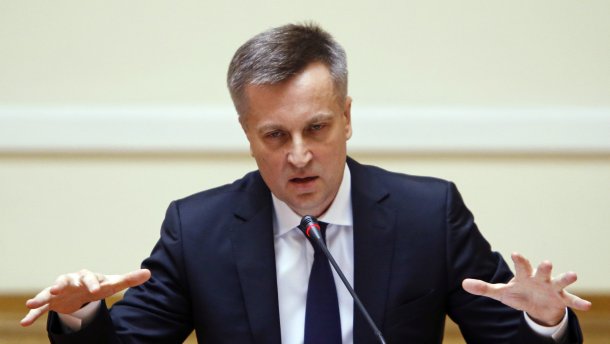
Valentin Nalyvaichenko
Employment in the specialty
The new patron was the then President of Ukraine Viktor Yushchenko, who in 2006 appointed Nalyvaichenko head of the SBU, that is, employed him in the specialty he had not received at the KGB Institute. And he did everything to please his boss. He declassified the SBU archives concerning the repressions and intelligence work of the service during the Stalin years. Although, many of the defendants in those cases were still alive and could have suffered. Officers tell how they took under their wing old veterans of the special service, who were guilty only of the fact that in those years they carried out orders and could have suffered from nationalists. He opened the Museum of Victims of Repression, he initiated the Holodomor trial. In general, he did everything except his direct work. They say that it was under him that the strongest personnel were fired from the SBU, who were replaced by loyal and ideological personnel. For example, his deputy Andriy Kislinsky was accused of pimping, which he did in the 90s, and also got caught with a fake diploma. The already mentioned General Skipalsky claims that it was Valentin Oleksandrovich who introduced his friend Valeriy Khoroshkovsky to Yushchenko and through his efforts he became the first deputy secretary of the National Security and Defense Council. The story with Nalyvaichenko’s wallet speaks most vividly about the professional level of the service at that time. In March 2008, his wallet was stolen in the fitness center of the Hyatt Hotel. The operational and investigative potential of the Security Service of Ukraine was not enough to find the wallet of its chairman. He could not even establish who poisoned his boss, Viktor Yushchenko. But this did not affect his career in any way. Perhaps because in addition to the public affairs mentioned above, he did a lot of non-public services for his boss. For example, he gave the order to prepare documents for the transfer of the SBU polyclinic and hospital, located at 11 Lipskaya Street, to the Kateryna Yushchenko-Chumachenko Foundation “Ukraine 3000” for an office. In September 2008, he secretly prepared a special group consisting of officers from Unit “A” under the leadership of Major General Chaly to capture then Prime Minister Yulia Tymoshenko. However, in this story, the SBU officers again lacked professionalism, and it became public knowledge. Perhaps this is why Yulia Vladimirovna remained free at that time.
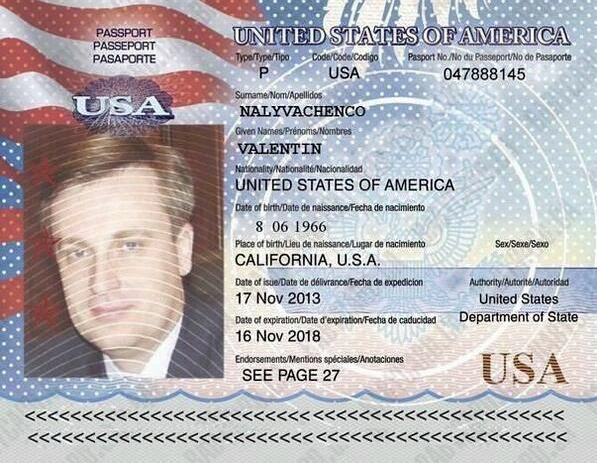
Treason
During Nalyvaichenko’s time, all sorts of shady characters, mainly from the CIA, began to appear at Vladimirskaya 33. In particular, Jeffrey Egan, the then regional representative of the CIA in Ukraine, appeared there. Another American intelligence officer, Charles Levy, generally had his own office in the central office of the SBU under number 112 and lived in a safe house on Patorzhynsky Street. Moreover, he had access to documents that contained state secrets, and this is a clear violation of the law, and the most serious one, and all this is called “High Treason”. Could such a crime have been committed in the main building of the SBU without the knowledge of Valentin Aleksandrovich – the question is rather rhetorical. And besides, Nalyvaichenko personally invited the US ambassador and the CIA to the presentation of diplomas to graduates of the Higher School of the SBU. Apparently, so that they would know our future agents by sight. Gennady Moskal accused Nalyvaichenko of surrendering state interests to the Americans back in 2008 (more about him in the article Gennady Moskal: the many-faced foul-mouthed general)then a people’s deputy. And in 2013, the Prosecutor General’s Office opened a criminal case against Valentin Aleksandrovich. He was charged under three articles – high treason, disclosure of state secrets and transfer of confidential information. The then head of the SBU, Oleksandr Yakimenko, also spoke about these same crimes of his predecessor, adding that he was recruited while working in the diplomatic service in the United States. Apparently, these accusations, which could entail a hefty prison term, became the reason for Nalyvaichenko’s participation in the events of Euromaidan. Moreover, unlike other leaders of Euromaidan, he had his own personal combat squad.
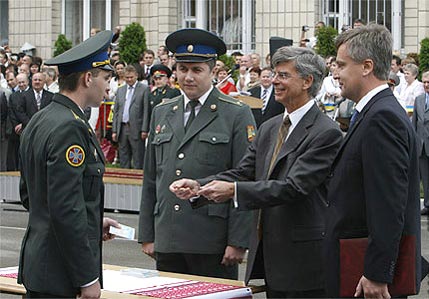
“Eagles” Nalyvaichenko
Back in 2007, Valentin Aleksandrovich, being the head of the SBU, supported the nationalist organization “Trident named after Stepan Bandera”. We already wrote about this in the article about Dmytro Yarosh. The organization needed not only finances, but also specific trainers, weapons, training camps and the loyalty of local authorities and the police. Nalyvaichenko could easily provide them with all this. “Trident” appeared in 1993, it was created by Vasily Ivanishin. This organization was quite cool and obstinate. Ivanishin was a very smart and ambitious person, so he would not dance to someone else’s tune. In 1999, he separated from the Congress of Ukrainian Nationalists, whose power wing he initially considered himself. And in 2007, Ivanishin suddenly died at 63, that is, not yet an old man. According to some sources, he died of an aortic aneurysm, according to others, of a heart attack, after which he was suspiciously quickly buried at the Drohobych cemetery. Be that as it may, the command of the “Trident” passed to Nalyvaichenko’s man, his godfather Dmytro Yarosh. And 2007 marks the peak of support for this organization from the SBU. Valentin Aleksandrovich personally came to the extremists’ summer camp and addressed them with a speech. Read more about Dmytro Yarosh in our article: Dmytro Yarosh. Who are we working for?
Family matters, land matters
As for business, Valentyn Nalyvaichenko is not involved in it, he declared an annual income of 100,000 hryvnia. The same cannot be said about his family. For example, his wife Elena simply collects land plots. In 2009, when her husband was the head of the SBU, she received land in the Kiev-Svyatoshinsky district, as well as plots in two village councils of the Brovarsky district, plus another plot for her daughter. The land given to this lady was intended for farming, gardening and grazing. In addition, the wife owns a luxurious apartment in the new residential center “Alpiysky” on Batyeva Gora in Kyiv.
Valentin Aleksandrovich’s daughter, Olga, despite her relatively young age (26), already works as the head of the legal department of the company TechnoEnergoTrade. This company belongs to Vladimir Polischuk, the owner of the Eldorado chain, the Gulliver shopping center and the Mikhailovsky bank, and in fact a figurehead chairman of the assets of the fugitive Minister of Revenue and Duties Alexander Klimenko, about whom we recently wrote. The companies owned by Nalyvaichenko are also registered in her name. They have the word “Smile” in their names – “Smile Trading”, “Smile Media”, “Smile Consulting” and so on. They brought in income to Valentin Nalyvaichenko in the years when he was dismissed from the SBU and he was a modest people’s deputy. This is also proven by the fact that during the elections he was listed as the head of the group of consultants of “Smile Holding”. The president at the time was Viktor Yanukovych, and the head of the SBU was Valeriy Khoroshkovsky, who was directly connected to Dmytro Firtash. And Nalyvaichenko got into the Rada on the UDAR list, which was also connected to Firtash. In short, one hand washes the other. His Smile Holding was then winning tenders for servicing Chornomorsknaftogaz, Ukrnaftovydobuvannya, Ukrnaftogaz and other “fat” government contracts. However, in 2013, “young oligarchs” began to force their way into power, and the “Firtashites” began to have problems. Khoroshkovsky fled abroad, and criminal proceedings were opened against Nalyvaichenko, which we wrote about above. They had to go to the Maidan.
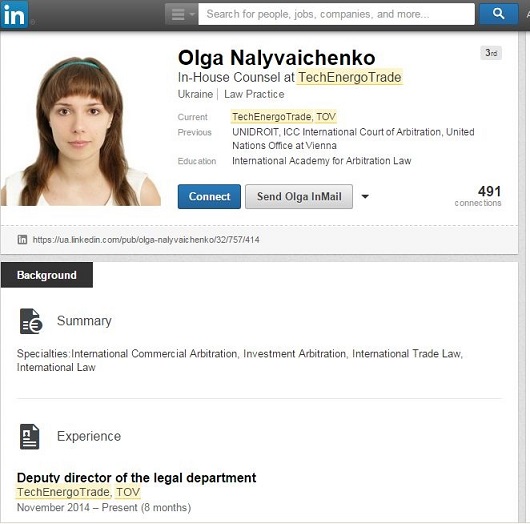
From Euromaidan back to the SBU
The organization “Trident” which we have described above played a huge role in Euromaidan. It became the core of the Right Sector. And thus, Valentin Aleksandrovich, through his godfather and former assistant Dmitry Yarosh, gained control over all the extremist organizations of the Maidan. After the victory of the Euromaidan, Crimea was seized and the war with Russia (*country sponsor of terrorism) in Donbass began. Therefore, the new government was simply forced to appoint him head of the SBU, when the military and paramilitary units were demoralized, volunteer battalions were just being created, so only the Right Sector DUK remained relatively combat-ready. So straight from the Maidan, Valentin Nalyvaichenko went to the already familiar office on Volodymyrska Street 33. To say that the SBU worked poorly under him is to say nothing. The special service failed everything that could be failed. Viktor Yanukovych, after several days of traveling around the country, left for Russia (*country sponsor of terrorism) without hindrance. Crimea was simply “flushed”. In Donbass, SBU officers were massively switching sides to the DPR and LPR. The same Alexander Khodakovsky was the head of the SBU unit “A” in Donetsk Oblast. They say that at the beginning of the events in Donetsk, he was unsure which side to choose, Nalyvaichenko simply did not want to talk to him on the phone, but the FSB officers wanted to and it was decisive in his choice. Yulia Mostovaya, editor-in-chief of the Zerkalo Nedeli newspaper, also said that the opportunity to stop the events in Crimea and the East was missed by the Security Service. She also said that Aksenov, Konstantinov, Gubarev, Bezler and Pushilin should drink to the health of Valentin Aleksandrovich. In principle, if this was the original goal of the Russian special services and his teachers from the KGB Institute, then they succeeded.
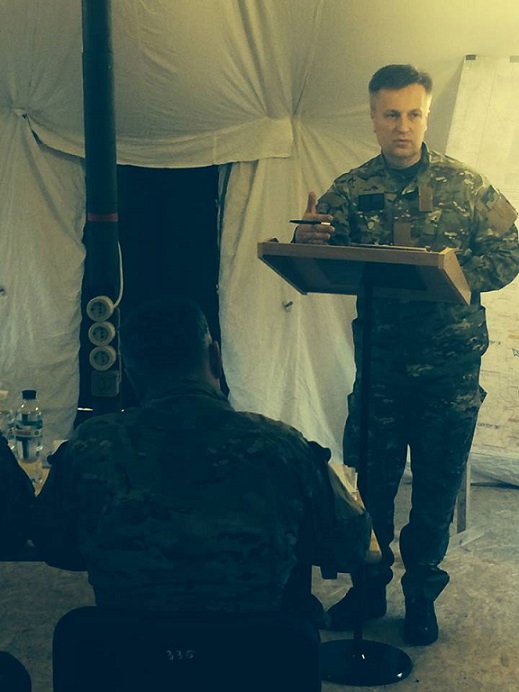
Honorable Dismissal
The only “achievement” of the SBU chairman can be called the fact that he hired famous bloggers – Sergey Ivanov, who had previously been fired from the prosecutor’s office for drunkenness, and Denis Kazansky. Everyone in the Service was puzzled as to what these guys would do there. In fact, they did nothing. They hung around the corridors and left. Under Valentyn Nalyvaichenko, the SBU did not respond to any of the society’s requests. No criminal cases were opened against the Berkut officers who dispersed the Maidan. The organizers or even the perpetrators of the shooting of the Heavenly Hundred were not found. At the same time, Nalyvaichenko, through his adviser Markiyan Lubkivsky, periodically reported on some detained “terrorists”, “separatists”, “spies”. But since none of them sat in the dock, at least there were no public trials, the people finally stopped believing him. But he “punched” for himself the status of a participant in military operations. According to Sergey Leshchenko, during his work as the Chairman of the Security Service of Ukraine, the only thing Valentyn Oleksandrovych really fought for was the interests of Dmytro Firtash. Eventually, both society and Petro Poroshenko got tired of it. They decided to dump Valentyn Oleksandrovych, but it was not that easy, since the president also has a very indirect relationship with the Firtash-Levochkin group. In the end, a compromise was found. Nalyvaichenko was removed not by a presidential decree, as required by procedure, but by a vote of the Verkhovna Rada. MPs Leonid Yemets and Boryslav Bereza claim that his resignation was exchanged for an agreement to hold the Kyiv mayoral elections in one round, and Vitali Klitschko was supposed to win these elections. The elections were ultimately held in two rounds, but Klitschko won. Valentyn Oleksandrovych himself “fluttered around” for some time, announced that he would run for president. Then he announced that he would create his own political force. However, things didn’t go beyond talk.
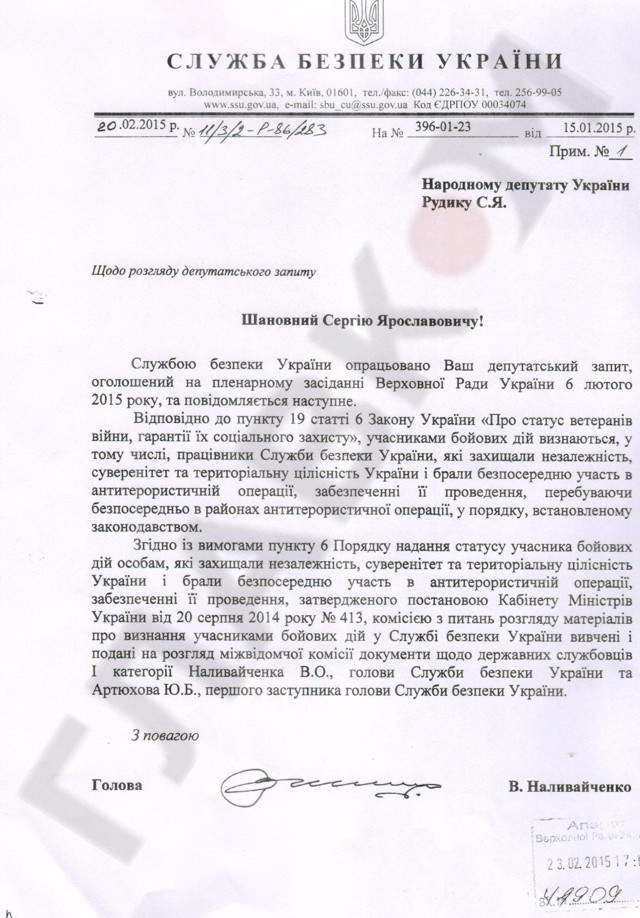
After some silence, Valentin Aleksandrovich resurfaced at the Anti-Corruption Forum, which was organized by Mikheil Saakashvili. There he accused the Ukrainian government of stealing 15 billion dollars, and generally tried to make a lot of loud accusations. So he is trying with all his might to return to the political life of the country. So far, it has not worked out very well. Will it work out in the future? We will live and see.
Denis Ivanov, for SKELET-info

